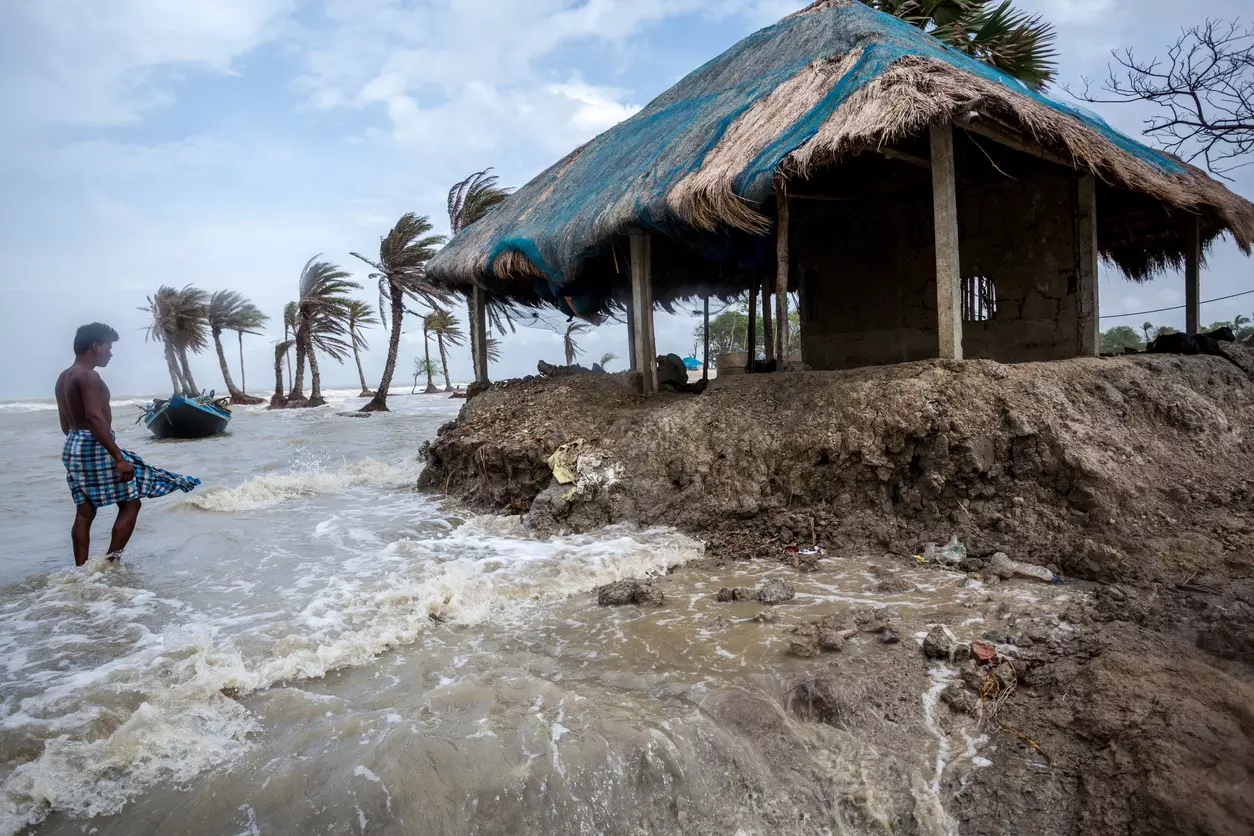
In fight with nature, robust climate data can help Sunderbans tide over crisis
Lack of studies and data on climate change hazards in India has made climate change adaptation and mitigation efforts in vulnerable Sundarbans more difficult, say environmentalists

Mohan Jana, a farmer in West Bengal’s Sunderbans, is nervous as the state is bracing for yet another cyclonic storm that has formed over the Bay of Bengal.
Salt water gushed into his village Gobardhanpur when a full moon high tide breached a river embankment last week, inundating swathes of farm land and ponds. Many houses, including Jana's home were flooded.
“My house, farmland and pond were damaged in the tidal wave. Even before the water could recede, we are now haunted by the spectre of a cyclonic fury. Survival is becoming increasingly difficult here (in Sunderbans),” said Jana.
Also read: Cyclone Dana: 3 lakh evacuated in Odisha; 6 coastal districts most vulnerable
Recurring cyclonic storms
The eastern coast of India has been facing the brunt of a cyclonic storm almost annually since 2019.
It has been hit by Fani (2019), Bulbul (2019), Amphan (2020), Yaas (2021), Sitrang (2022) and Remal (2024). Now a severe cyclonic storm christened Dana is set to strike the Odisha-Bengal coastline between Thursday night and Friday morning.The increase in frequency of cyclones, the term incidentally was first coined in Kolkata (then Calcutta) by a British mariner Henry Piddingt in 1848, has spiked land salinity in the coastal region of Bengal, particularly Sundarbans, severely impacting soil productivity.
Also read: In pictures: Sunderbans in the aftermath of cyclone Amphan
Farmers hit hard
Mangrove sapling plantation drive in Gosaba at the behest of an NGO, the Sundarban Foundation
As a result, residents are forced to migrate from their villages or turn to prawn cultivation, rampantly clearing mangrove forests, the delta’s protective shield against storms.
“My paddy field became unproductive after Amphan. I tried salinity-resistant paddy farming but the yield was not good. Having no other way to feed my family, I have migrated to Kerala’s Palakkad district to work at a construction site,” said Sanat Mandal of Gosaba in Sundarbans.
Climate change is making oceans and air warmer and this in turn is increasing the intensity and frequency of cyclonic storms, said Kamal Kumar Tanti, the director of the Centre for Environment and Climate Action. More water is accumulated in warmer air, which causes heavy rainfall and flooding, he added.
India lacks rich data
Lack of studies and data on climate change hazards in India has made climate change adaptation and mitigation efforts more difficult, Tanti said, pointing out that there is no adequate data on climate-change induced migration and change in livelihood and agricultural pattern.
The Azim Premji University's Centre for Climate Change and Sustainability, in a recent research, has highlighted the importance of climate data and the need to address the lack of it in India.
The study found that a lack of access to climate data is a significant barrier to effective climate action.
“One of the most pressing issues confronting society today is climate change and although it is now a familiar term, it is often confused with other kinds of ecological changes. In addition, most policy discussions on climate impacts acknowledge that we lack information at scales less than the level of the state, for example at the district, block or cluster levels.
“Since climate change significantly impacts livelihoods, human and ecological health, this absence of baseline data at finer scales becomes a barrier to designing suitable mitigation and adaptation measures. Therefore, obtaining this information at smaller spatial scales is important,” it observed.
Also read: Vulnerable Sunderbans once again faces cyclone wrath
Climate change and census
The effect of climate change on economic development, ecosystem and human lives can be analysed for different environmental zones using baseline data, experts say.
They are now demanding inclusion of data on effects of climate change in the ensuing census which, according to Union home minister Amit Shah, would be resumed “very soon”.
“Census data would help identify vulnerable populations and state of the environment. Effective strategies to deal with the problem can be chalked out based on the findings,” Tanti added.
However, the Registrar General of India recently indicated that population census data will not be used for environmental and climate change analysis anytime soon.
“The population enumeration schedule of the ensuing Census has not yet been notified. However, in earlier Censuses no question related to climate change has been included in the Census questionnaire,” the RGI office said in reply to an RTI query on whether the coming census would include questions related to climate change.
This response, Tanti said, was indeed disappointing.
